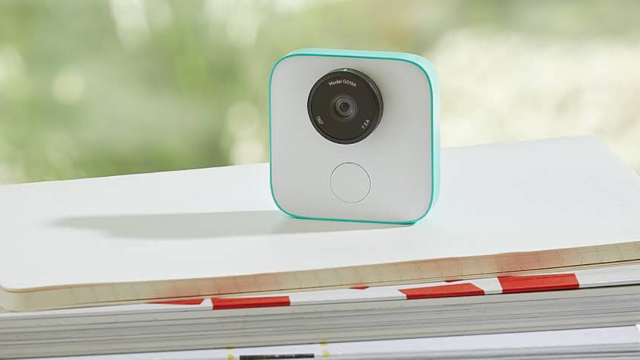The marriage of cameras and artificial intelligence opens the doors to all kinds of interesting capabilities. For now, however, Google is introducing its Clips wireless smart camera with the pitch that AI will enable it to take better pictures than a dumb camera. While the $249 Clips uses machine learning to automatically capture short clips (motion photos without audio) of people and pets, Apple’s latest iPhone relies on face recognition to unlock, and now startup Lighthouse AI plans to add intelligence to a security camera to analyze the results.
The New York Times reports that Google Clips is a camera “the size of a tin of mints, and it has no screen.” The front has a lens and a button; most of the time, the user relies on the camera’s AI to determine “facial expressions, lighting, framing and other hallmarks of nice photos,” although it also sports a button in case the user actually wants to snap a shot. The camera can “be affixed to your jacket, set on a tabletop, carried in your palm or placed anywhere else with a view.”
On a family trip to Disneyland, the NYT reviewer “barely took a photo,” but the camera took a couple hundred short clips, “some of them were quite good” and many of them “emotionally … on a higher plane.”
An automatic camera does raise the worry that Google can spy on the user, or that the user can spy on others, but “the device is mostly unconnected from the Internet” and all the AI takes place on the device.
Wired also reviewed Google Clips, noting first what it isn’t: “a replacement for your smartphone camera, or even for your point-and-shoot,” and, without a microphone, “it’s no good for filming,” nor is it an action camera or a wearable. Clips works best when set on a stationary surface, and is intended to capture moments. In other words, “point it at a sleeping baby, and it’ll go to sleep too.”
The AI chip recognizes imagery and makes internal decisions about which clips to take; those clips are available in a companion app, which “shows you a scrollable feed of all the clips stored on the camera.” A swipe right saves the clip and a swipe left deletes it. The user can post a saved clip to the Internet.
“The on-board computer-vision AI is really good at sensing both overt and subtle emotional cues,” said the reviewer. “Even a subtle smile will get noticed and saved.” Google “enlisted professional photographers to train the Clips’ AI … and they concentrated the training on people and pets.” So, although Google’s “more robust computer vision systems can recognize cars, hats, shoes, or the ocean,” Clips is targeted at taking winning shorts of family, friends and pets.


No Comments Yet
You can be the first to comment!
Sorry, comments for this entry are closed at this time.